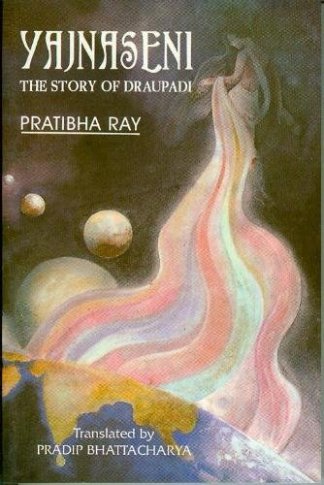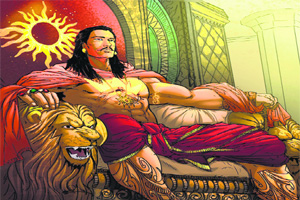
Yajnaseni by Pratibha Ray and translated by Pradip Bhattacharya is a retelling of the Mahabharata from the viewpoint of Draupadi. In the original epic she is the wife of the five Pandava brothers, the protagonists. This book makes Draupadi into the protagonist, similar to “The Palace of Illusions”. Readers who are unfamiliar with the original tale will probably find this book confusing. The Mahabharata has a huge cast of characters and this book doesn’t thoroughly them all. It was written by an Indian for Indians, so it presupposes a base level of knowledge about the original story (remember, this was originally written in Oriya). The sentence construction is also obviously Indian, seeming imitative of the protracted, overly dramatic dialogue style of ancient texts. Before I rant against the core message of the book, I should note that I enjoyed reading it for its unique perspective on gender issues, which is rarely heard in the West. Also, while the dialogue may have been a bit stilted or odd at times, the descriptions of war, death, sorrow as well as of natural beauty, urban beauty, courage, and strength were quite lovely. I’m a sucker for descriptive prose.
Despite being a tale told from a female perspective, this is basically an anti-feminist work in my evaluation. Draupadi constantly endures hardship because of her gender, and the frankly unreasonable expectations, which the Pandava brothers have of her. Even accepting arranged marriages as a given social norm, she is forced into a polygamous marriage, which she is initially quite hostile to. Throughout the story she is forced to live in the forest, forced into a scheduled mating pattern with her five husbands, has her children killed in a war due to the actions of her husbands, is humiliated in court due to her oldest husband gambling her away as an article of property, etc. etc. etc. She bears all of this willingly, and even lovingly. She is the epitome of the “good Hindu wife”. She worships her husbands (particularly Arjuna) literally as Gods. Jai Patidev.
Now, it would be one thing if the story were written for us to read this and say “What a tragic character! She had to endure all of this abuse because of the faulty moral beliefs of her day. If only she could have broken out of that paradigm and seen her own enslavement.” But it isn’t written that way at all. It is written for us to admire her for her submission, and willingness to live entirely for her husbands’ sake and for Krishna. Her obedience and submission, i.e. her adherence to her wifely Dharma regardless of any consequences is supposed to be admired. This is precisely why the morality of the Bhagavad Gita if followed diligently (and God forbid, in conjunction with the moral goals of Manu Smriti) is pathologically self abusive. Thankfully, there is a much better moral model in the story: Karna. But before I get to that, here are some quotes relating to Draupadi to illustrate what I’m talking about:
Draupadi: “I have made an offering of my life to keep the five Pandavas bound together”
“Removing pride from within me, I pour out my femininity like an offering of flowers before my husbands, made fragrant by the water of desireless action. I try not to be envious under any circumstances…. I never eat or lie down before my husbands eat or lie down. I am up before they get up. I am never lazy in their work. If they return from a long journey, I keep seat, water, food, resting place ready for them. Despite servants being available, I keep watch on household chores. I cook their favorite food myself and serve it with my own hands. I do not burden them with my own worried and anxieties. Rather, participating in their concerns, I offer my views. I do not spend too much time on toilet, bath and dressing. If my husbands are far away, I refrain from decorating myself. I do not make interest in matters which they dislike. Without their having to tell me I am able to sense their likes and dislikes. I am never interested in arguing fruitlessly or in rolling about in meaningless mirth. The most important thing is that I never doubt them, nor do I ever shower them with unnecessary compliments. Similarly I never keep anything secret from them… I anticipate their wishes, even their commands to servants. I never describe the wealth, prosperity, luxury of my father’s house before my husbands… I do not mention any woman as more fortunate than myself. I do not feel it necessary to display my innumerable desires before my husbands. I do not spend time in private with another man. I avoid women who are of a cunning nature. In front of my husbands I try to appear fresh, beautiful, ever youthful.”

The next quote requires some context. All of the Pandavas have barely escaped death, and Draupadi is clasping Arjuna’s feet in joyful relief that he has survived. Arjuna is the husband who she is most truly in love with, and she has just poured her heart out onto him:
“Arjun quickly removed his feet, ‘As a wife, all [the Pandava brothers] are your husbands. You ought to behave in the same manner with all… If we countenance injustice then the defeat of the Pandavas is inevitable. Draupadi, remove this mountainous burden of unjust love from me. That is all’ I thought my grief would provide Arjun with some encouragement. But lecturing me regarding justice, law, rules, he again turned me into an untouchable. My tears keep flowing, washing away the guilt and sin of loving my husband.”
Ok. After I read this book I checked to see what people on Goodreads were saying. Some were critical of Draupadi’s depiction, but some were not. Examine this user’s review of the book:
“I must admit that I have always had a sneaking fondness for the proud princess of Panchal. I have found in her a strength that is lacking in most other mythological heroines. Sita, I have always visualised as a doormat, but masculine culture will portray her as the womans softer side, while Draupadi is unabashedly and prominently a queen, with a womans pride, a sharp intellect and a strong will. Very few women in Indian mythology were strong enough to speak their own minds. Imagine then, my delight in coming across a novel in which Draupadi finally comes into her own.”
Even considering all of the above passages, this (presumably female and presumably Hindu) reviewer still considers Draupadi a strong and proud character. Clearly, the system of morality represented by Draupadi is alive and well.
Thank God Karna is in the tale.

In my eyes, this retelling makes Karna into the greatest hero of the story. He is kind to those who treat him well, and spiteful to those who denigrate or abuse him for no reason. He is also supremely generous, courageous, and honest. The reader is supposed to think that he is deeply flawed because of his pride, egoism, and “arrogance”. However I see these as virtues, especially when compared to the slavish nature of Draupadi and the servile obedience exhibited by the Pandavas towards Krishna. Karna’s boldness in combination with his more traditionally “moral” traits (honesty, generosity, loyalty etc.) makes him a well-rounded character, and (almost) an ideal Man. He is the greatest warrior who has ever lived. He has reason to be proud. His greatest flaw is supposed to be that he relies on himself to achieve greatness rather than relying on Krishna. This is to me, his greatest virtue.
Perhaps Draupadi should take some lessons from Karna.
“Mocking, Karna said, ‘Lady! I acknowledge that your husband [Arjuna] is brave. But I fail to understand what sort of man he is. If I were in Arjun’s place and Ma [Queen Kunti] had ordered that the woman I had won in the svayamvar [contest to win a bride] was to be shared by other brothers, I would have left that kingdom…I do not consider blindly obeying improper directives as the sign of manhood. This is the only difference between Arjun and myself.”
Karna is the best.
Again, while it might look like I’m highly critical of this book I actually really enjoyed it. Characters like Draupadi almost never exist in American books (outside of 50 Shades of Grey). Besides, if you have a more dignified, achievement oriented moral outlook there is always Karna to root for.




